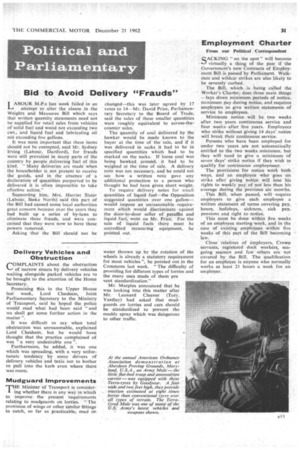Employment Charter
Page 33

If you've noticed an error in this article please click here to report it so we can fix it.
From our Political Correspondent
SACKING "on the spot" will become virtually a •thing of the past if the Government's new Contracts of Employ-, ment Bill is passed'by Parliament. Walkouts and wildcat strikes are also likely to
be severely curbed. , The Bill, which is being called the Worker's Charter, does three main things —lays down minimum periods of notice, minimum pay during notice, and requires employers to give written statements of service to employees.
Minimum notice will be two weeks after two years continuous service and four weeks after five years. Employees who strike without giving 14 days' ,notice will break their continuous service.
Persons who have been employed for under two years are not automatically entitled to the two weeks,minirrium, but they will need to give a minimum of seven days' strike notice if they wish to qualify for continuous employment.
The provisions for notice work both . ways, and an employee who goes on strike after giving notice will lose his rights to weekly pay of not less than his average during the previous six months. This Bill, when passed, will require employers to . give each employee a written statement of terms covering pay, hours, , holidays, sickness, sick pay, pensions and right to 'notice.
This must be done within five weeks of an employee starting work, and in the case of existing employees within five . weeks of this part of the Bill becoming
Close relatives of employers, Crown Servants, registered dock workers, sea• going seamen and few others are not covered by the Bill. The qualification for an employee is anyone who normally works at least 21 hours a week for an employer.




















































































